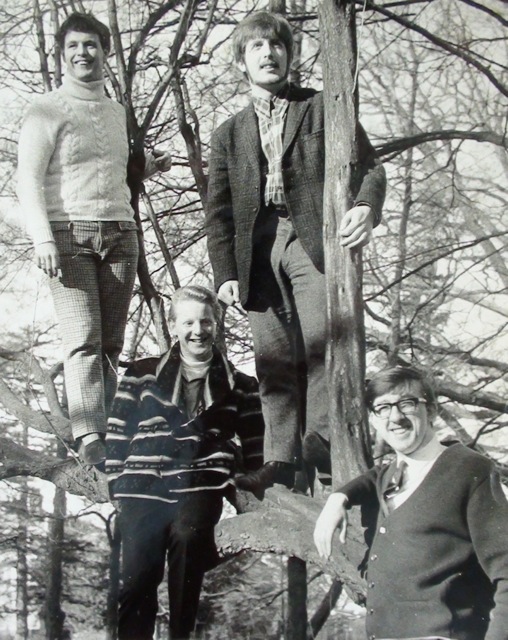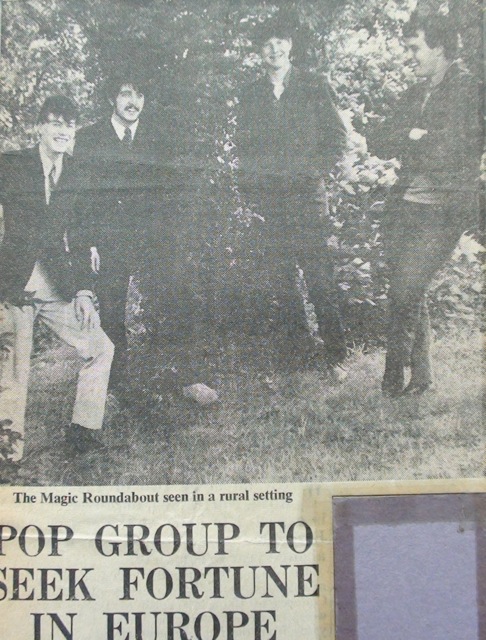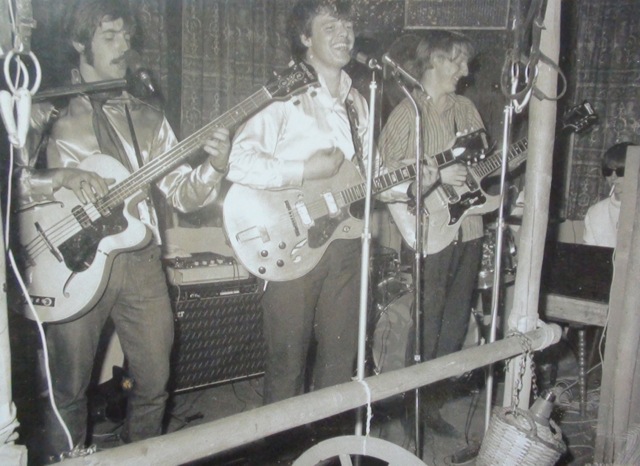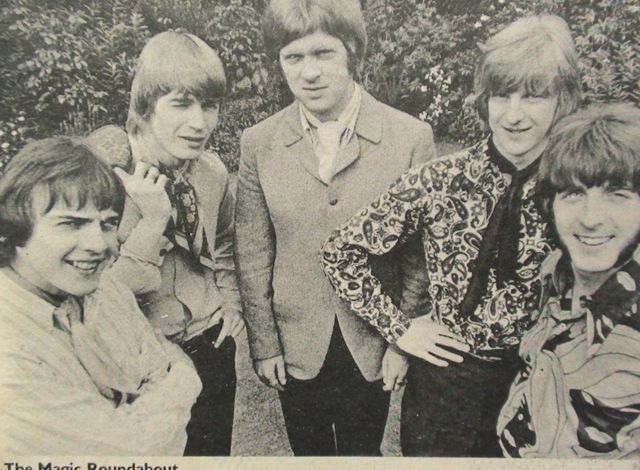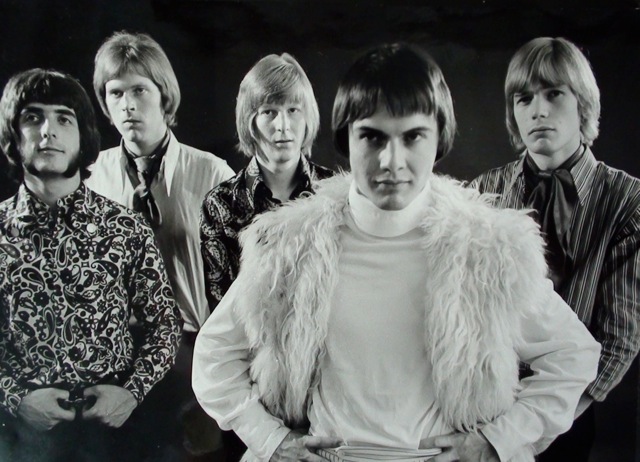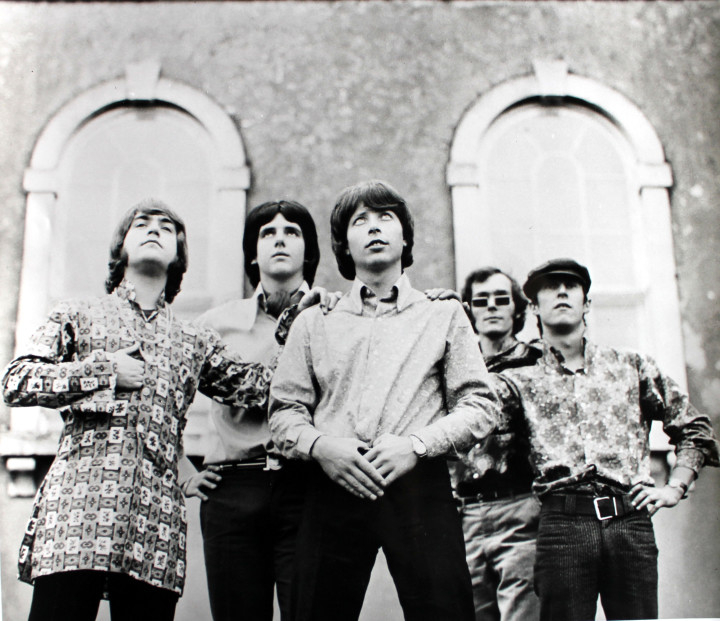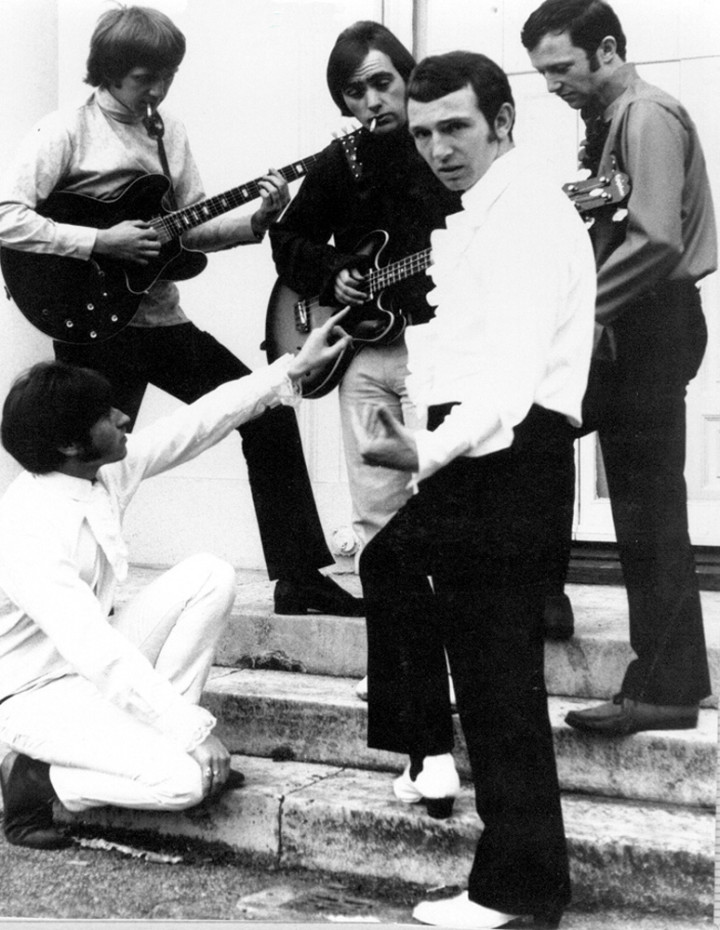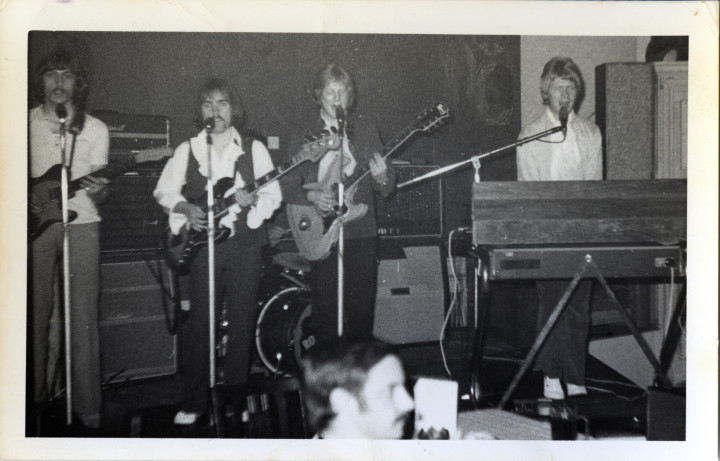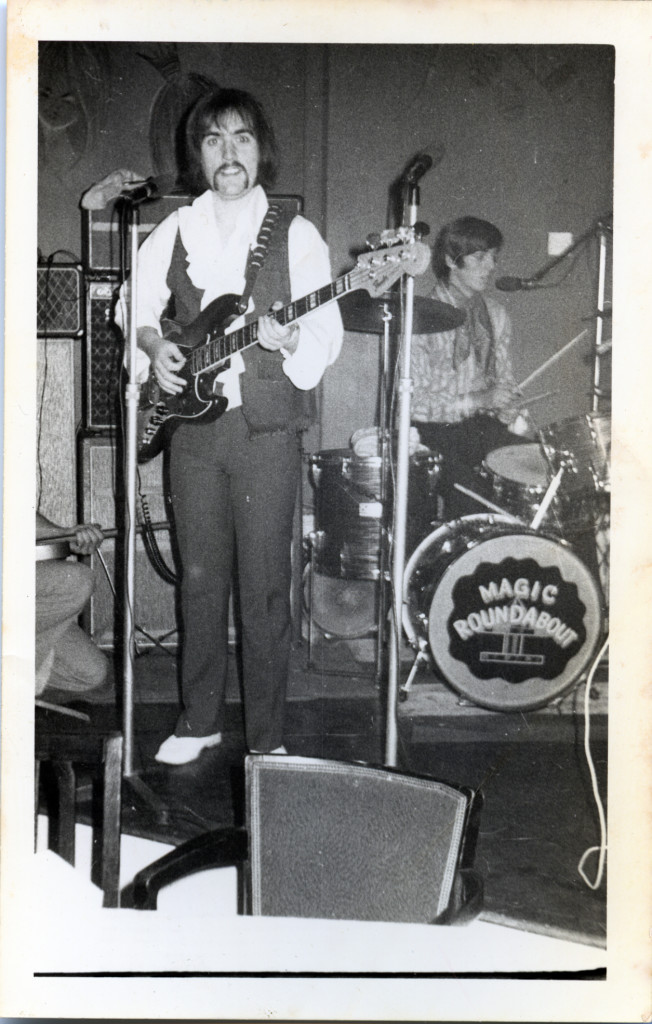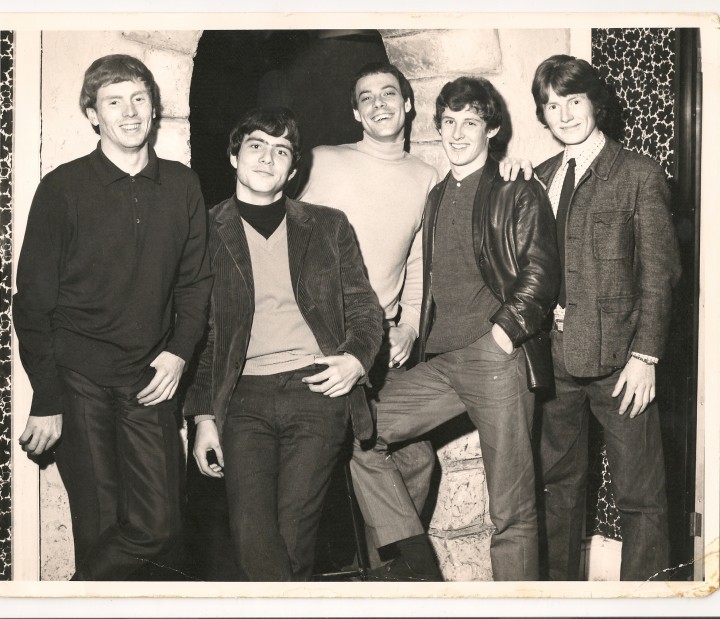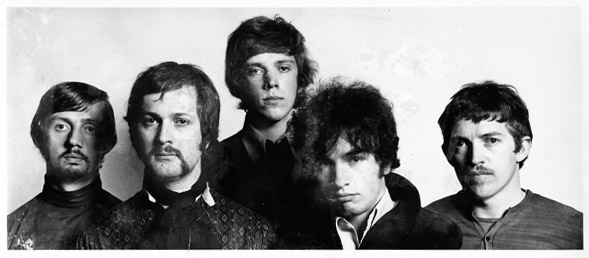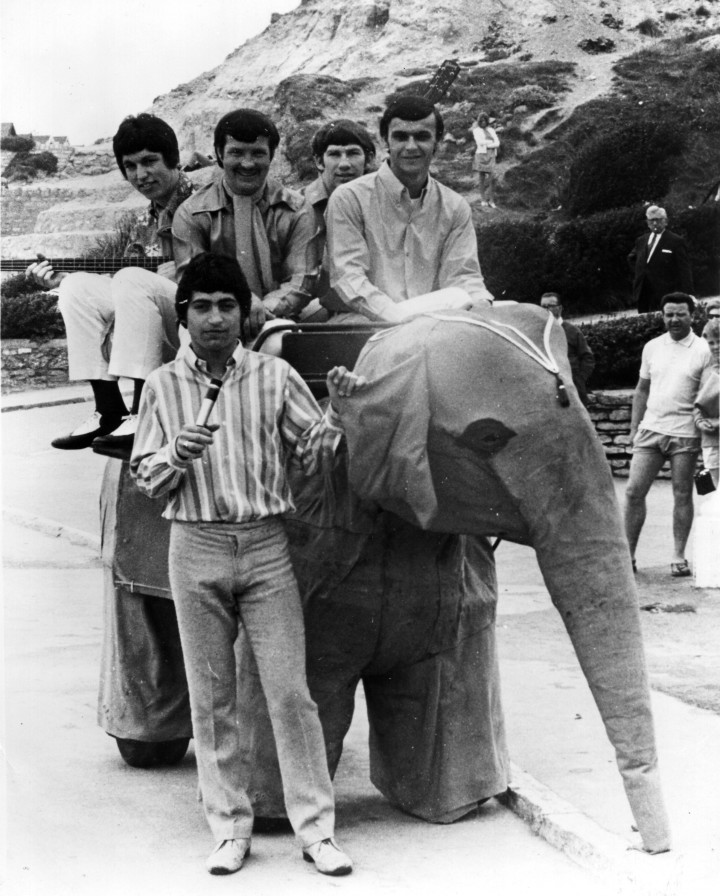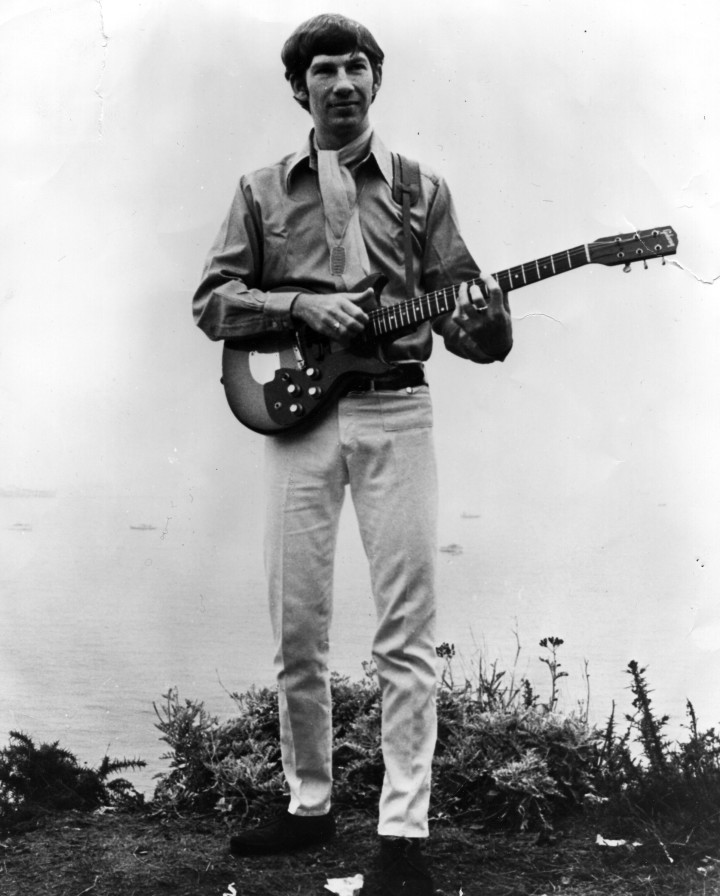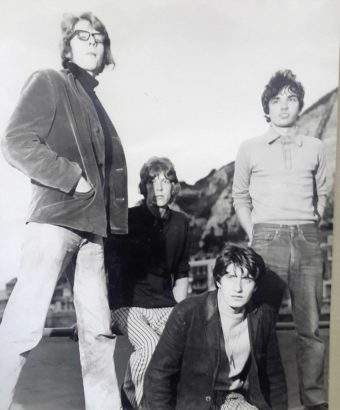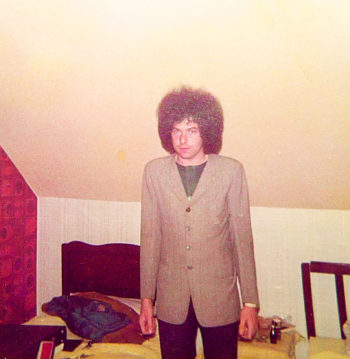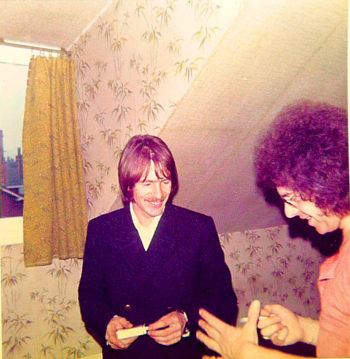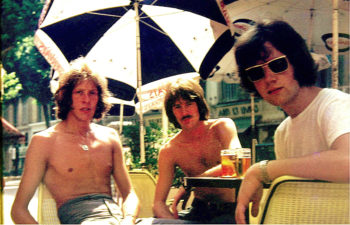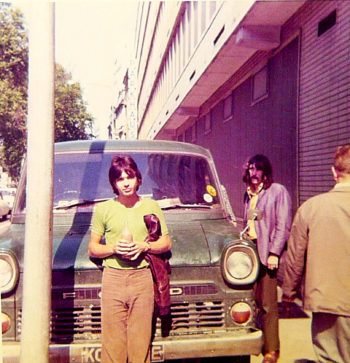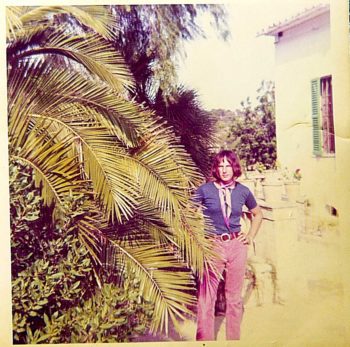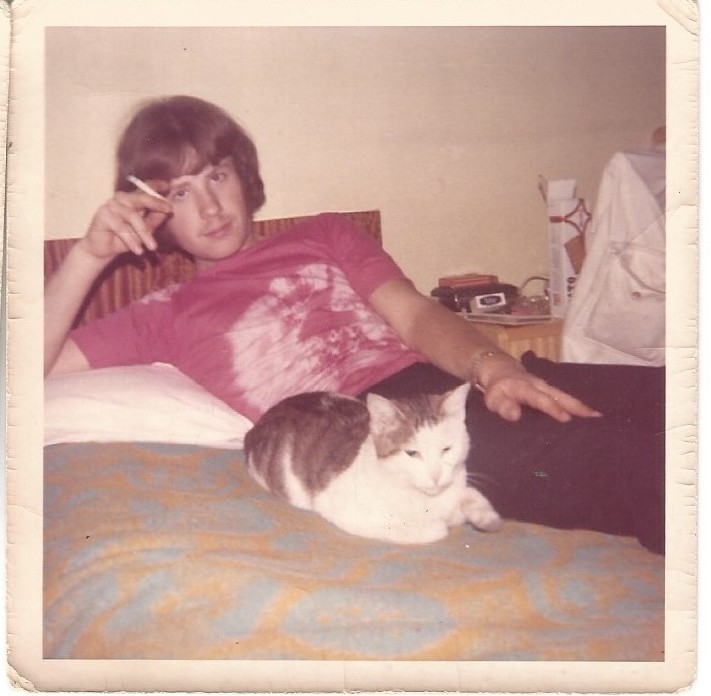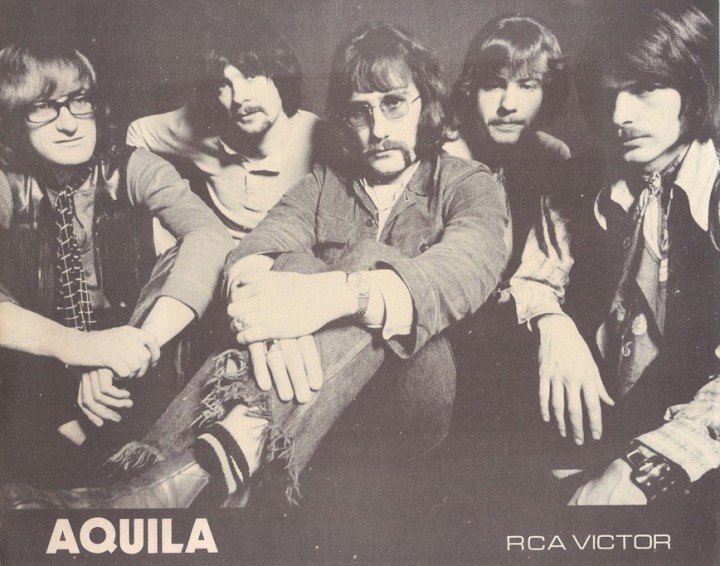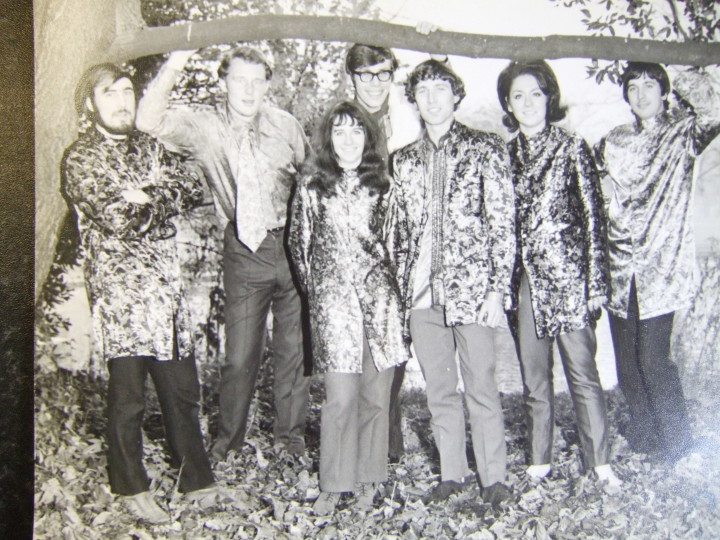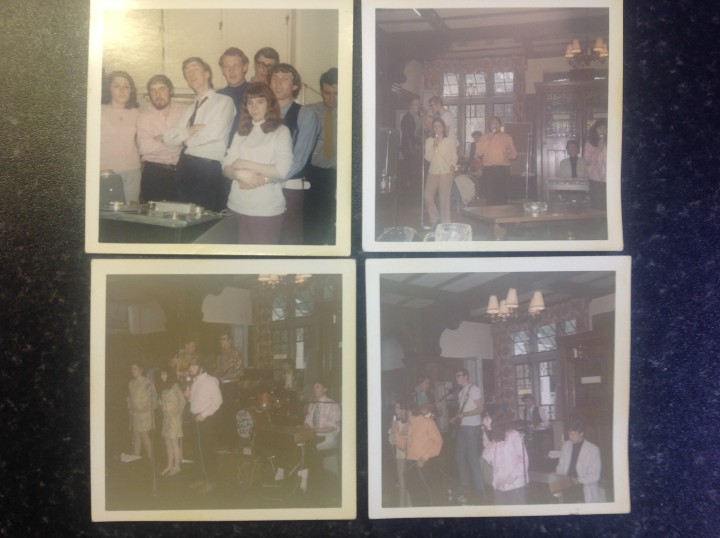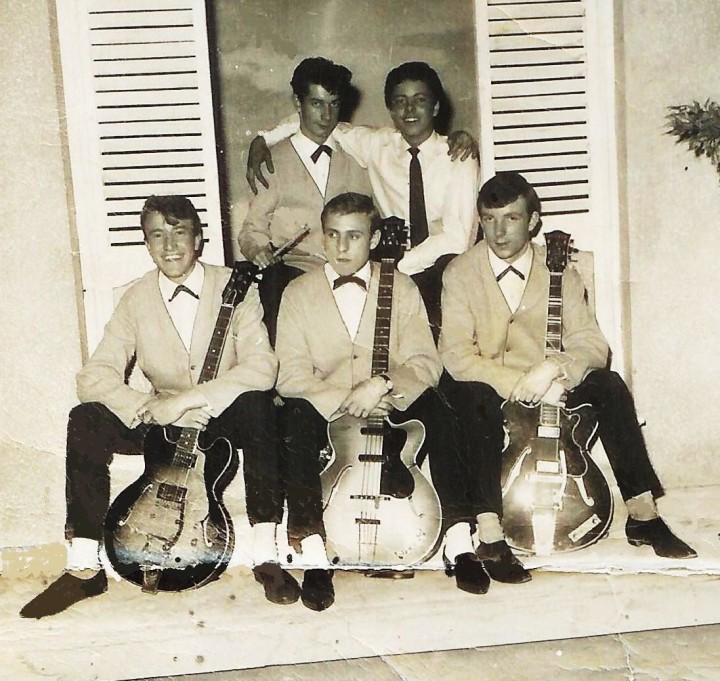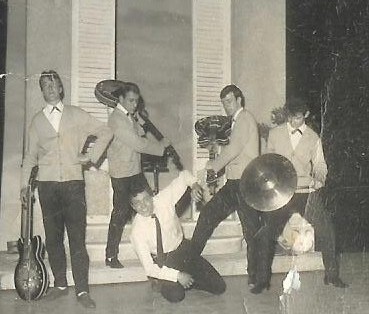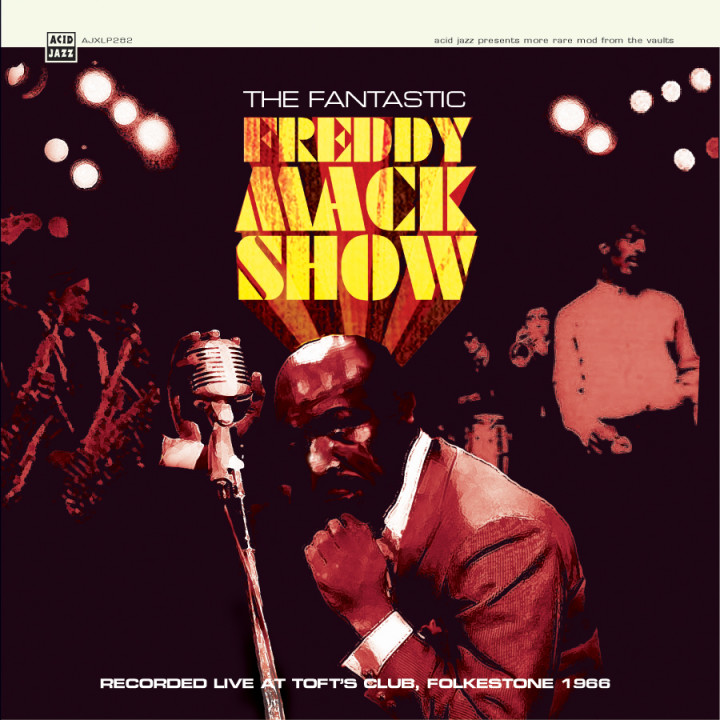
Retired American light-heavyweight boxer Freddie Mack, sometimes spelt Freddy Mack and also known as Mr Superbad, relocated to the UK in 1965 and established a second career as a soul singer and disc jockey.
Between late 1965 and the mid-1970s, Mack fronted a succession of bands featuring a staggering number of notable British R&B and soul musicians. Originally called The Mack Sound, the singer’s bands also worked under the names The Freddie Mack Sound, The Fantastic Freddie Mack Show and the Freddie Mack Extravaganza.
Thanks to the recollections of former Doc Thomas Group lead guitarist Dave Tedstone, who took over from Stuart Taylor (himself deputising for Ged Peck) the band’s formation included the following when he joined on 5 April 1967:
Freddie Mack – lead vocals
Derry Wilkie – lead vocals
Tony Morgan – lead vocals, congas
Kenneth Harry – lead vocals
Kookie Eaton – lead vocals
Dave Tedstone – lead guitar
Roy Davies – organ
Alan Cartwright – bass
Dick Morrisey – tenor saxophone
Bernie Wehrman – tenor saxophone
Chris Dawe – trumpet
Jeff Bridge – tenor saxophone
Sonny Corbett – trumpet
Roger Truth – drums
As Tedstone explains, his guitar playing was closer in style to ex-Pirate Mick Green than Ged Peck’s, who Taylor had been covering for.
Tedstone remembers that Dick Morrisey departed during the early half of the year (although he would return in late November). Also, Derry Wilkie left during May or June 1967 to pursue a solo career.
In mid-June Roger Truth announced his decision to move on and auditions were held later that month (see below in gig listing). Two drummers were brought in to replace him.
The first was Terry Stannard, who had previously played with The Pack and The Flowers of Wisdom and would go on to work with White Rabbit, The Mirrors, One and Kokomo among others. The other drummer was Ron Berg, who succeeded him in White Rabbit before playing with Blodwyn Pig.
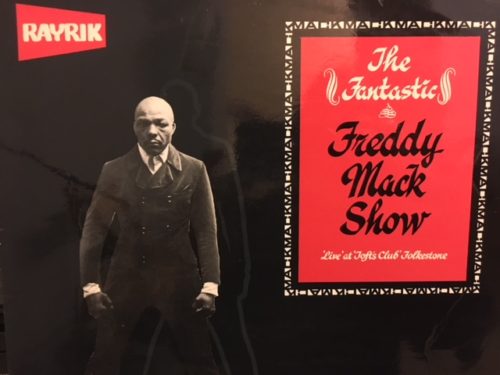 Mistakenly credited to 1966, it was this formation (minus Derry Wilkie and Dick Morrisey) that appeared on the album, The Fantastic Freddy Mack Show – ‘Live’ at ‘Toft’s Club’ Folkestone. Tedstone says that not many venues at the time had stages that were large enough to accommodate a dual drum set up.
Mistakenly credited to 1966, it was this formation (minus Derry Wilkie and Dick Morrisey) that appeared on the album, The Fantastic Freddy Mack Show – ‘Live’ at ‘Toft’s Club’ Folkestone. Tedstone says that not many venues at the time had stages that were large enough to accommodate a dual drum set up.
As a result, Terry Stannard played the first set and Ron Berg played the second. On the album, which was cut in mid-July (see the gig listing below but most likely date is 15 July), Stannard appears on side one while Berg is on side two.
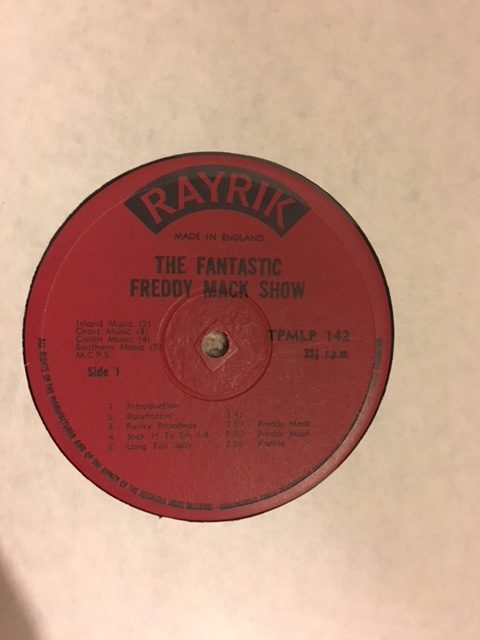
Selected gigs:
5 April 1967 – Birmingham gig (marks Dave Tedstone’s debut)
Tedstone says his debut was in Birmingham but I’ve looked in the newspapers and there is no listing. I wonder whether he mistakenly attributed this to Freddie Mack and not Jimmy James & The Vagabonds who he joined in early 1968.
6 April 1967 – Overseas Visitors Club, west London (This was most likely Earl’s Court)
8 April 1967 – St George’s Ballroom, Hinckley, Leicestershire

12 April 1967 – Hemel Hempstead Pavilion, Hemel Hempstead, Herts with The Cortinas (Says 14-piece band)
14 April 1967 – George Inn, Wilby, Northamptonshire

15 April 1967 – Matlock Bath, Matlock, Derbyshire
19 April 1967 – Steering Wheel, Weymouth, Dorset (Around this time Melody Maker advert says it’s a 10-piece band)
20 April 1967 – Gig in Stafford, Dorset

21 April 1967 – Steering Wheel Club, Dorchester, Dorset
22 April 1967 – Beachcomber, Nottingham
23 April 1967 – Cromer, Norfolk (most likely the Olympia)
24 April 1967 – BBC recording (according to Melody Maker)
25 April 1967 – Concorde, Southampton, Hampshire
Derry Wilkie left around now or in June. Dick Morrisey most likely left around the same time but returned in late November.
5 May 1967 – Upper Cut, Forest Gate, east London with The Bohemians

6 May 1967 – California Ballroom, Dunstable, Bedfordshire with Two of Each and New Jump Band
11 May 1967 – Overseas Visitors Club, west London (most likely Earl’s Court)

12 May 1967 – Kinkotab, Hitchin College of Further Education, Hitchin, Herts with The Triads
13 May 1967 – Gaiety Ballroom, Ramsey, Cambridgeshire with The En-Devers
13 May 1967 – Nite Owl, Leicester with The Executive
14 May 1967 – Garden Club (location not known but most likely Covent Garden, London)
16 May 1967 – High Wycombe Town Hall, High Wycombe, Buckinghamshire
17 May 1967 – Eel Pie Island, Twickenham, west London

18 May 1967 – Tiles, Oxford Street, central London
19 May 1967 – King Alfred’s College, Winchester, Hampshire
20 May 1967 – Maple Ballroom, Northampton
21 May 1967 – Swan, Yardley, West Midlands
23 May 1967 – Carlton Club, Erdington, West Midlands
23 May 1967 – Melody Maker says this is a day of rest. However, I’ve found references to gigs in Warrington and also Bournemouth (the latter with The Mike Cotton Sound with Lucas and The Pill)

24 May 1967 – Hemel Hempstead Pavilion, Hemel Hempstead, Hertfordshire with The Associates
26 May 1967 – Golden Diamond, Sutton-in-Ashfield, Nottinghamshire
27 May 1967 – Toft’s, Folkestone, Kent

29 May 1967 – Belfry Hotel, Wishaw, West Midlands with The Monopoly and The Exception
30 May 1967 – Beachcomber, Nottingham
31 May 1967 – RANS Lossiemouth, Moray, Scotland

1 June 1967 – RANS Arbroath, Arbroath, Scotland
2 June 1967 – Gig in Hawick, Scotland
3 June 1967 – Gig in Kelso, Scotland
4 June 1967 – Cosmo Club, Carlisle, Cumbria
5-8 June 1967 – Gigs in Paris, France

9 June 1967 – Cesar’s, Bedford, Bedfordshire

10 June 1967 – Jazz & Blues Festival ’67, Norwich, Norfolk with The Small Faces, The Ronnie Scott Quartet, Spencer’s Washboard Kings, The Settlers, Mike Daniels’ Big Band and The Broads City Blueblowers
11 June 1967 – Beachcomber, Nottingham

11 June 1967 – Britannia Rowing Club, Nottingham
12 June 1967 – Three Horseshoes, Letchworth, Herts
13 June 1967 – Concorde Club, Southampton, Hampshire
14 June 1967 – Eel Pie Island, Twickenham, west London
16 June 1967 – Il Rondo, Leicester
17 June 1967 – Bath Pavilion, Matlock, Derbyshire
18 June 1967 – Le Metro, Birmingham
19 June 1967 – Carton Club, Warrington, Cheshire

20 June 1967 – Ritz, Bournemouth, Dorset
21 June 1967 – Princess Pavilion, Falmouth, Cornwall with Blood & Sand
22 June 1967 – Blue Lagoon, Newquay, Cornwall with The Vigilantes
23-24 June 1967 – Winter Gardens Ballroom, Penzance, Cornwall
Melody Maker reports that Freddie Mack auditioned for a drummer and 74 turned up after he’d advertised in the music paper. This seems the most plausible point at which Roger Truth announces he is leaving.

25 June 1967 – Steering Wheel, Dorchester, Dorset
26 June 1967 – Cook’s Ferry Inn, Edmonton, north London
26 June 1967 – Orford Cellar, Norwich, Norfolk

27 June 1967 – Sherwood Rooms, Nottingham with Dave Dee, Dozy, Beaky, Mick and Titch
28 June 1967 – De Valance Ballroom, Tenby, Wales
30 June 1967 – Pavilion, Hemel Hempstead, Hertfordshire with Force Four
Roger Truth left around about now and Terry Stannard and Ron Berg joined.
1 July 1967 – Burton’s, Uxbridge, northwest London
2 July 1967 – Central Hotel, Gillingham, Kent
4 July 1967 – Concorde, Southampton, Hampshire
6 July 1967 – Huntington Youth Centre, Huntingdon, Cambridgeshire

7 July 1967 – California Ballroom, Dunstable, Hertfordshire with The Shell Shock Show
8 July 1967 – St George’s Ballroom, Hinckley, Leicestershire
9 July 1967 – Britannia Rowing Club, Nottingham
10 July 1967 – Melody Maker says they are recording
11 July 1967 – High Wycombe Town Hall, High Wycombe, Buckinghamshire

12 July 1967 – Industrial Club, Norwich, Norfolk
14 July 1967 – Grammar School, Gravesend, Kent
15 July 1967 – Toft’s, Folkestone, Kent (this is the most likely date for the recording of the LP)
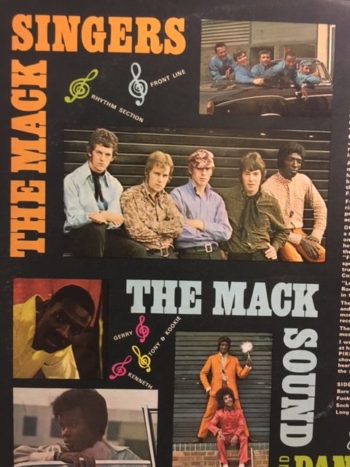
16 July 1967 – Golden Torch, Tunstall, Staffordshire
18 July 1967 – Assembly Hall, Aylesbury, Buckinghamshire
19 July 1967 – Blue Lagoon, Newquay, Cornwall

21 July 1967 – Town Hall, Torquay, Devon
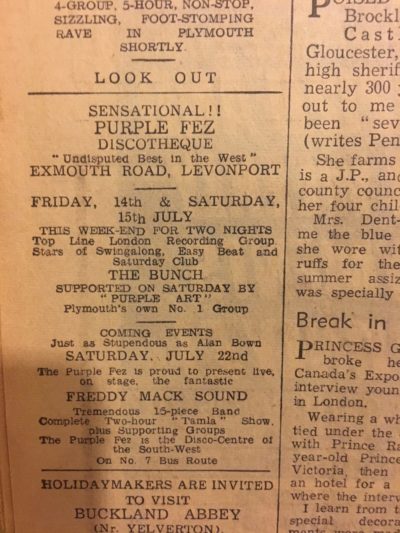
22 July 1967 – Purple Fez, Devonport, Plymouth, Devon
23 July 1967 – Eel Pie Island, Twickenham, west London

25 July 1967 – Carlton Club, Erdington, West Midlands
27 July 1967 – RAF Witham, Lincolnshire
28 July 1967 – Hemel Hempstead Pavilion, Hemel Hempstead, Hertfordshire with The Beachcombers

29 July 1967 – Memorial Hall, Barry, Glamorgan, Wales

30 July 1967 – Swan, Yardley, West Midlands
Terry Standard left around about now (most likely to join Herbie Goins & The Night-Timers but then subsequently White Rabbit).
1-2 August 1967 – Gigs in Paris, France
5 August 1967 – Britannia Rowing Club, Nottingham
9 August 1967 – Princess Pavilion, Falmouth, Cornwall with Modesty Blues

10 August 1967 – Blue Lagoon, Newquay, Cornwall with The Californians
11 August 1967 – Winter Gardens, Penzance, Cornwall
12 August 1967 – Flamingo Ballroom, Redruth, Cornwall
14 August 1967 – Whisky A Go Go, Wardour Street, Soho, central London
15 August 1967 – High Wycombe Town Hall, High Wycombe, Buckinghamshire (billed as Freddy Mack & The Mack Sound featuring Hon-ey!)
16 August 1967 – Gig in Scotland (needs confirmation)

18 August 1967 – Gay Tower Ballroom, Edgbaston, West Midlands with Bobby Johnson Big Band
19 August 1967 – Burton’s, Uxbridge, northwest London

20 August 1967 – Beau Brummel, Alvaston Hall Hotel, Nantwich, Cheshire
21 August 1967 – Carlton Club, Warrington, Cheshire
22 August 1967 – Concorde, Bassett Hotel, Southampton, Hampshire

25 August 1967 – Cesar’s, Bedford, Bedfordshire
26-27 August 1967 – Toft’s, Folkestone, Kent
28 August 1967 – Hemel Hempstead Town Hall, Herts (needs confirmation)
29 August 1967 – Ritz Ballroom, Bournemouth, Dorset
30 August 1967 – Tropicana Club, Croydon, south London
31 August 1967 – Scottish tour commences today and runs until 12 September

1-2 September 1967 – Two Red Shoes, Elgin, Scotland
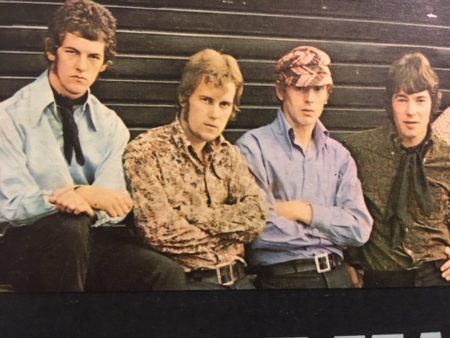
8 September 1967 – Ballerina, Nairn, Scotland with The T-Set

9 September 1967 – Civic, Wrexham, Wales with Dynamic Honey and System 5 (not possible considering other Scottish dates)
9 September 1967 – Gig in Aberdeen, Scotland
10 September 1967 – RNAS Lossiemouth, Moray, Scotland
11-12 September 1967 – More gigs in Scotland
13 September 1967 – Travel to Belgium for gigs

17 September 1967 – Central R&B Club, Central Hotel, Gillingham, Kent with Honey
24 September 1967 – Black Prince Hotel, Bexley, southeast London
29 September 1967 – Flamingo, Wardour Street, Soho, central London with The Gabb and The Scots of St James
30 September 1967 – Tin Hat, Kettering, Northamptonshire with The Survivors

1 October 1967 – Co-op Hall, Warrington, Cheshire
2 October 1967 – Park Hall Hotel, Goldthorn Park, Wolverhampton, West Midlands with The Californians and Barmy Barry’s Show

4 October 1967 – Hemel Hempstead Town Hall, Hemel Hempstead, Herts
6 October 1967 – Il Rondo, Leicester
7 October 1967 – Enfield College of Technology, Enfield, north London

8 October 1967 – Le Metro, Birmingham

9 October 1967 – Bluesville ‘6 Clubs, St Matthew’s Bath Hall, Ipswich, Suffolk
12 October 1967 – Brays Grove Youth Club, Harlow, Essex

13 October 1967 – Pavilion Ballroom, Weymouth, Dorset with Pink Floyd and Denis Scott & The Soundsmen
14 October 1967 – Toft’s, Folkestone, Kent
15 October 1967 – Corn Exchange, Maidstone, Kent
16 October 1967 – 100 Club, Oxford Street, central London
17 October 1967 – Concorde, Bassett Hotel, Southampton, Hampshire
18 October 1967 – Travel to Paris, France
19-30 October 1967 – Gigs in Belgium
31 October 1967 – Shenley Green Youth Club, Shenley Green, West Midlands

2 November 1967 – Golden Torch, Tunstall, Staffordshire
3 November 1967 – Apex Club, Ashford, Kent

4 November 1967 – Earlham Park, Norwich, Norfolk with Elmer Gantry’s Velvet Opera

5 November 1967 – Cosmo Club, Carlisle, Cumbria with The Reg Jones Explosion
6 November 1967 – Quaintways, Chester, Cheshire
7 November 1967 – Ritz, Bournemouth, Dorset

8 November 1967 – Skyline Ballroom, Hull, East Riding of Yorkshire with The Gospel Garden, Delroys Good Good Band and The Disturbance
10 November 1967 – Mayfair Ballroom, Smallbrook Ringway, Birmingham

10 November 1967 – Digbeth Civic Hall, Digbeth, West Midlands
11 November 1967 – Bradford University, Student Union, Bradford, West Yorkshire
11 November 1967 – Industrial Club, Norwich, Norfolk (needs confirmation)
12 November 1967 – South Bank Jazz Club, Grimsby
13 November 1967 – 100 Club, Oxford Street, central London
14 November 1967 – Ritz, Bournemouth, Dorset
15 November 1967 – The Catacombs, Eastbourne, East Sussex
17 November 1967 – Top Spot Ballroom, Ross-on-Wye, Herefordshire with The Dipps (Gloucester Citizen)

18 November 1967 – Royal Lido, Prestayn, Wales with The Rayners (Rhyl & Prestayn Gazette)

19 November 1967 – Beau Brummel Club, Alvaston Hall Hotel, Nantwich, Cheshire with The Jaytree Organisation
20 November 1967 – Bamboo Club, Stockport, Greater Manchester
Around this time, Dick Morrisey rejoins on tenor sax (according to Melody Maker‘s 25 November issue, page 3).
21-26 November 1967 – Gigs in Scotland (Aberdeen gigs may not have happened)
21 November 1967 – Two Red Shoes, Elgin, Scotland (billed as Freddie Mack & His Road Show) (advert lists 16-piece band) (Source: https://tworedshoes.wordpress.com/)
23 November 1967 – RNAS Lossiemouth, Moray, Scotland

24 November 1967 – Ballerina, Nairn, Scotland with The Brown Heart Federation
25-26 November 1967 – Gigs in Aberdeen, Scotland

25 November 1967 – West Runton Pavilion, West Runton, Norfolk with The Sonics (probably rescheduled to 2 December gig below)
27 November 1967 – Carlton Club, Warrington, Cheshire
29 November 1967 – Reading Town Hall, Reading, Berkshire with The Beachcombers and Memphis Gents
Ron Berg left around this time and subsequently joined White Rabbit. Colin Davy, who’d worked with Georgie Fame in late 1967 joined.

1 December 1967 – Industrial Club, Norwich, Norfolk
2 December 1967– West Runton Pavilion, West Runton, Norfolk

6 December 1967– Hemel Hempstead Pavilion, Hemel Hempstead, Herts with Tramline ’67
7 December 1967 – Medway College of Art, Rochester, Kent
8 December 1967 – Southampton University, Southampton, Hampshire

9 December 1967 – Clacton Town Hall, Clacton, Essex with Lee Shelby Federation
10 December 1967 – Samantha’s, Bournemouth, Dorset

11 December 1967 – St Matthew’s Bath Halls, Ipswich
12 December 1967 – Keele University, Keele, Staffordshire
14 December 1967 – RAF Whitton (assuming this is Whitton, London)
15 December 1967 – Red Spot Club, Whetstone, Leicester with The Changing Scene

16 December 1967 – Night Prowler, Yarmouth, Norfolk with Combined Achievement
17 December 1967 – Leofric Hotel, Coventry, West Midlands
19 December 1967 – Queen’s Hotel, Grays, Essex
22 December 1967– Aurora Hotel, Gillingham, Kent

23 December 1967 – St James’ Spectacular, Chesterfield, Derbyshire with Joe Cocker’s Grease Band

26 December 1967 – Mayfair Ballroom, Smallbrook Ringway, West Midlands with The Fabulous Invaders

29 December 1967– Aurora Hotel, Gillingham, Kent
Around early January 1968, the group most likely included the following musicians:
Freddie Mack – lead vocals
Tony Morgan – lead vocals, congas
Kenneth Harry – lead vocals
Dave Tedstone – lead guitar
Roy Davies – organ
Alan Cartwright – bass
Dick Morrisey – tenor saxophone (may not have stayed long)
Bernie Wehrman – tenor saxophone
Chris Dawe – trumpet
Sonny Corbett – trumpet
Colin Davy – drums
Selected gigs:
7 January 1968 – Maidstone Corn Exchange, Maidstone, Kent with Formula Six
8 January 1968 – 100 Club, Oxford Street, central London
11 January 1968 – Concord, Basset Hotel, Southampton, Hampshire
12 January 1968 – Exeter University, Exeter, Devon
Melody Maker reports in its 13 January issue, page 13, that a continental tour is planned but does not say when.
13 January 1968 – Winter Gardens Ballroom, Penzance, Cornwall
14 January 1968 – Central R&B Club, Central Hotel, Gillingham, Kent
15 January 1968 – Koups Klub, Laker’s Hotel, Redhill, Surrey

19 January 1968 – Gari Ballroom, Great Yarmouth, Norfolk with Somethin Else

20 January 1968 – Gaiety Ballroom, Ramsey, Cambridgeshire with Out of Sight Blues
21 January 1968 – Black Prince Hotel, Bexley, southeast London
22 January 1968 – Whisky A Go Go, Wardour Street, Soho, central London
23 January 1968 – Gig in Aberystwyth, Wales (The Cambrian Times has no record of any shows in the town this day)
24 January 1968 – Gig in Cardiff, Wales
25 January 1968 – Gig in Epsom, Surrey (possibly Ewell Tech College)
25 January 1968 – Gig in Birmingham, West Midlands
27 January 1968 – Gig in Southport, Lancashire (most likely Floral Hall)
28 January 1968 – The Place, Hanley, Staffordshire
30 January 1968 – Whisky A Go Go, Wardour Street, Soho, central London
31 January 1968 – Hemel Hempstead Pavilion, Hemel Hempstead, Herts with The Lamb Bros and Co
3 February 1968 – Leeds University, Leeds, West Yorkshire
4 February 1968 – Cosmo, Carlisle, Cumbria
5 February 1968 – Quaintways, Chester, Cheshire with Kaspers Engine and Perfurmed Garden
5 February 1968 – Howard Platt Discotheque Show, Jazz and Blues Festival, Norfolk with The Kinks and Geno Washington & The Ram Jam Band
6 February 1968 – Gig in Birmingham, West Midlands
7 February 1968 – Gig in Grays, Essex
9 February 1968 – Gig in Leicester

10 February 1968 – Starlight Ballroom, Boston Gliderdrome, Boston, Lincolnshire with The Informers Plus 2
11 February 1968 – Gig in Manchester
14 February 1968 – Ship & Rainbow, Wolverhampton, West Midlands
Around the start of the second week in February, Freddie Mack advertised for three reed players suggesting he was looking to rebuild the band. Chris Dawe was among the horn players leaving and later joined Swegas.
19 February 1968 – Cosmo, Carlisle, Cumbria with Joe E Young & The Tonicks

23 February 1968 – Birmingham University Students’ Union, Edgbaston, West Midlands with Elmer Gantry & The Velvet Opera
24 February 1968 – Burton’s, Uxbridge, northwest London
28 February 1968 – Ship & Rainbow, Wolverhampton, West Midlands
Around this time Dave Tedstone left to join Jimmy James & The Vagabonds and would then reunite (briefly) with Colin Davy in Geno Washington & The Ram Jam Band in August 1968.
Kenneth Harry also left about now and Sonny Gibbons took over on vocals.
I would personally like to thank Dave Tedstone for helping to piece this part of the story together.
PLEASE LEAVE COMMENTS BELOW TO ADD/CORRECT INFORMATION
Live gig sources:
During my research on Freddie Mack from 1965-1969, I have found gigs from a huge range of newspapers. These include the following sources:
The Cornish Guardian, Derby Evening Telegraph, Evening Sentinel, Melody Maker, West Briton & Royal Cornwall Gazette, Lincolnshire Guardian, Birmingham Evening Mail, NME, Northwich Chronicle, Sheffield Star, Warrington Guardian, Wrexham Leader, Eastern Evening News, Maidestone Gazette, Ipswich Evening Star, Bournemouth Evening Telegraph, Nottingham Evening Post, Cambridgeshire Times and Express & Star, Forres, Elgin & Nairn Gazette, Derbyshire Times.
Copyright © Nick Warburton. All Rights Reserved. No part of this article may be reproduced or transmitted in any from or by any means, without prior permission from the author. To contact the author, email: Warchive@aol.com or nick_warburton@hotmail.com


